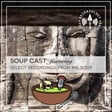
The Russia-Ukraine Conflict: Polish Historians’ Perspectives on the War Next Door! - WB 2nd April 2022
The Russia-Ukraine Conflict: Polish Historians’ Perspectives on the War Next Door! - WB 2nd April 2022
Welcome to Watching Brief. As the name implies, each week Marc (Mr Soup) & Andy Brockman of the Pipeline (Where history is tomorrow's news) cast an eye over news stories, topical media and entertainment and discuss and debate what they find.
#archaeologynews #thepipeline #archaeosoup
Support us on Patreon: https://www.patreon.com/archaeosoup
0:00 Introduction
4:05 Paul Barford Interview
28:44 Alina Nowobilska Interview
1:04:08 Closing Thoughts
***
Link of the Week:
Disasters Emergency Committee:
***
Links:
Pipeline April Fools’ Article:
CBA, CIfA & FAME LAUNCH JOINT MEDIA OPERATION:
http://thepipeline.info/blog/2022/04/01/cba-cifa-fame-launch-joint-media-operation/
Paul Barford:
@PortantIssues on Twitter
Portable Antiquity Collecting and Heritage Issues:
https://paul-barford.blogspot.com/
Alina Nowobilska:
@WW2girl1944 on Twitter
@hack_history on Twitter
Refugees fleeing Ukraine (since 24 February 2022):
https://data2.unhcr.org/en/situations/ukraine
‘Black Archaeology’ in Eastern Europe: Metal Detecting, Illicit Trafficking of Cultural Objects, and ‘Legal Nihilism’:
https://www.counteringcrime.org/black-archaeology-in-eastern-europe
Raphael Lemkin Center for Documenting Russian Crimes in Ukraine:
The word “genocide” was first coined by Polish lawyer Raphäel Lemkin:
https://www.un.org/en/genocideprevention/genocide.shtml
At least 53 culturally important sites damaged in Ukraine – Unesco:
Inside the Efforts to Preserve Ukraine’s Cultural Heritage:
News about the war from the official Ukrainian perspective:
135 war crimes against cultural heritage recorded in Ukraine:
